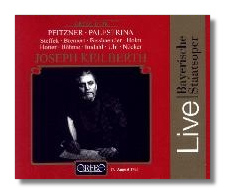
The Internet's Premier Classical Music Source
Related Links
- Latest Reviews
- More Reviews
-
By Composer
-
Collections
DVD & Blu-ray
Books
Concert Reviews
Articles/Interviews
Software
Audio
Search Amazon
Recommended Links
Site News
 CD Review
CD Review
Hans Pfitzner

Palestrina
- Ighino - Hanny Steffek, soprano
- Silla - Ingeborg Bremert, mezzo-soprano
- A young doctor - Brigitte Fassbaender, soprano
- Palestrina - Richard Holm, baritone
- Cardinal Borromeo - Hans Hotter, baritone
- Cardinal von Lothringen - Kurt Böhme, bass
- Morone - Heinz Imdahl, baritone
- Novagerio - Fritz Uhl, bass-baritone
- Count Luna - Hans Günter Nöcker, baritone
Bavarian State Orchestra & Opera Chorus/Joseph Keilberth
Orfeo 515993 3CDs Recorded in August, 1963
Hans Pfitzner (1869-1949) was a German composer, not prolific though he wrote in all genres, whose work, with one exception, has pretty much disappeared from view. His music is late Romantic in style and fundamentally derived from Wagner, but he had an individual voice, using more diatonicism and dissonant textures, often ascetic and mystical in feeling. He was an intellectual, a follower of Schopenhauer, an anti-Semite in the world of music though not elsewhere (he distanced himself from the Nazis and Thomas Mann and Bruno Walter were among his champions).
The exception is his masterpiece, the "musical legend" Palestrina - which was heard fairly often in Germany (though not elsewhere) after its composition in 1917; then it too disappeared, but has been produced and recorded several times in recent years. It is an opera of ideas rather than action; its fundamental subject is (to quote New Grove) "the ideal realization of the artist's freedom both in self-determination and in responsibility to humanity". Specifically, it deals with Palestrina's effort to write a Mass for his patron, Cardinal Borromeo, that would persuade the Council of Trent (1563) not to ban polyphonic music for church services, and reflects Pfitzner's conservative esthetic principles as defender of musical tradition from modernists and Philistines. It has the largest cast of any opera I know; there are 11 singing roles in addition to those listed above, plus choirs of the ghosts of great composers and angels, and requires a large orchestra and chorus
I suspect that much of the praise given to the piece results more from an uncritical acceptance of its philosophical underpinnings and seriousness of purpose than from enjoyment of its musical content. It is through-composed and largely declamatory, with no clearly marked arias and few extended melodic lines. The confrontation between the outside world of hustle and bustle (the confrontations of contending factions in the Council of Trent) and the inner world of the composer turns out to be fairly effective dramatically, and there are moments of beauty, notably the choruses of dead composers and angels toward the end of Act I. But the opera is long, long-winded, and (to me) for the most part boring; 15 unbroken minutes of Palestrina musing about his responsibilities is a lot to take. The orchestration is deliberately archaic in feeling, thin and uninteresting.
My response (especially to the orchestra) may be partly the fault of this recording, taken from a 1963 performance in Munich. In the two principal roles, Richard Holm is excellent and believable as Palestrina, with a clear, incisive baritone voice and excellent diction, but Hotter as Borromeo sounds wooly and blustery throughout. The rest of the case is very good, especially Hanni Steffek as Palestrina's son Ighino. It's hard to tell much about Keilbarth's direction; it seems slow and uninspired, and the orchestra sounds distant and somewhat muffled. There is a more impressive 1973 recording (DG) led by Kubelík with Gedda and Fischer-Dieskau in the cast that is probably a better bet if you're interested in this massive and curious work.
Copyright © 1999, Alexander J. Morin




















